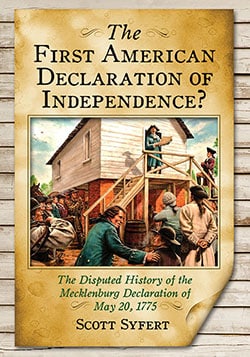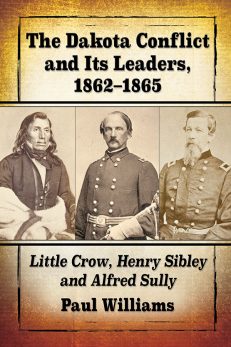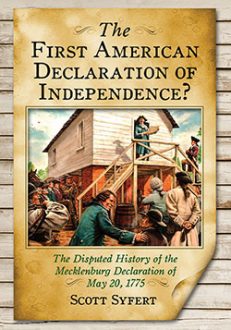The First American Declaration of Independence?
The Disputed History of the Mecklenburg Declaration of May 20, 1775
$29.95
In stock
About the Book
This is a comprehensive history of one of the greatest mysteries in American history—did Mecklenburg County, North Carolina, declare independence from Great Britain more than a year before anyone else? According to local legend, on May 20, 1775, in a log court house in the remote backcountry two dozen local militia leaders met to discuss the deteriorating state of affairs in the American colonies. As they met, a horseman arrived bringing news of the battles of Lexington and Concord. Enraged, they unanimously declared Mecklenburg County “free and independent” from Great Britain. It was known as the “Mecklenburg Declaration of Independence” (“MecDec” for short). A local tavern owner named James Jack delivered the MecDec to the Continental Congress, who found it “premature.” All of this occurred more than a year before the national Declaration of Independence. But is the story true? The evidence is mixed. John Adams believed the MecDec represented “the genuine sense of America” while Thomas Jefferson believed the story was “spurious.” This book sets out all of the evidence, pro and con.
About the Author(s)
Bibliographic Details
Scott Syfert
Format: softcover (7 x 10)
Pages: 260
Bibliographic Info: 37 photos, 3 maps, notes, bibliography, index
Copyright Date: 2014
pISBN: 978-0-7864-7559-9
eISBN: 978-1-4766-1292-8
Imprint: McFarland
Table of Contents
Acknowledgments ix
Preface 1
Prologue: “One of the deepest mysteries” 3
Part I. Life in the Carolina Backcountry (1663–1775)
1. “Always insolent to their Governors”: The Rule of the Lords Proprietors 12
2. “People of desperate fortune”: The Scots-Irish Settle Mecklenburg County 19
3. “Highly injured and aggrieved”: Alexander Craighead and the Presbyterians 28
4. “Brutal Sons of Bitches”: Thomas Polk and the Sugar Creek War 36
Part II. High Treason (1775–1781)
5. “General frenzy”: Polk Summons a Meeting 48
6. “Fury and revenge”: May 19, 1775 60
7. “There was not a dissenting voice”: The Mecklenburg Declaration Is Made 68
8. “A rash act”: Treason and Second Thoughts 76
9. “I set out the following month, say June”: The Ride of Captain James Jack 83
10. The Empire Strikes Back: “A most treasonable publication … in Mecklenburg” 91
Part III. Opening Arguments (1817–1829)
11. From Beyond the Grave: The “copy in an unknown hand” 100
12. “He has copied the spirit, the sense, and the expressions of it Verbatim”: John Adams Accuses Thomas Jefferson of Plagiarism 111
13. “I believe it spurious”: Thomas Jefferson, Original Mecklenburg Declaration Skeptic 119
Part IV. The Mecklenburg Controversy (1829–2012)
14. “Solemn proof”: John McKnitt Alexander’s Version of the Story 128
15. “Independence lang before any body else”: Eyewitnesses and Local Legends 137
16. “All former laws are now wholly suspended”: The Mecklenburg Resolves Confuse Everybody 150
17. Tampering with the Evidence: Charles Phillips and the Davie Copy 159
18. Death by a Thousand Cuts: The Case Against the Mecklenburg Declaration of Independence 170
19. “The faithful disperse”: The Controversy Fizzles Out 179
Part V. Clues and Explanations
20. Red Herrings: Fraud, Forgery and the Case Against Jefferson 190
21. “Frey u. independent von England”: The Moravian Explanation 201
22. Occam’s Razor: Summing Up the Case for the Mecklenburg Declaration 210
Chapter Notes 221
Bibliography 237
Index 241
Book Reviews & Awards
- “Syfert delves deeply into the issue in this well researched and highly readable volume…engaging and informative”—Journal of the American Revolution
- “This book is one of the finest pieces of historical detective work I’ve ever read. Scott Syfert is the Sherlock Holmes of the Mecklenburg Declaration of Independence, able to deal with serious and substantial issues concerning Thomas Jefferson, revolutionary politics, states’ pride, accusations of plagiarism, and government cover-ups. He writes in an engaging, scholarly and wholly convincing manner.”—Andrew Roberts, author of Storm of War and Masters and Commanders
- “Using honed skills of a lawyer and historian, Syfert presents a highly readable and believable accounting of the first formal declaration of independence from English rule in the American colonies and the controversies that it created.”—Joe Epley, author of A Passel of Hate
- “Leave it to Scott Syfert to rescue and then bring vividly to life a little-known (outside of Charlotte, NC) story of our Revolutionary past and the urgent need by our ancestors for freedom.”—Ken Burns, documentary filmmaker






